I have been thinking about Abraham, Sarah, and Isaac—and how alone all three of them were at crucial moments. Abraham, alone in his beliefs; Sarah, alone in her barrenness; Isaac, alone, walking toward being sacrificed—or not.
Every time I think there is nothing left to say about these three, about their unforgettable walks through the world, about what they did do and what they did not do, I find something new, something unexpected. To me, the Torah is the ultimate re-reading experience, and it is always wonderful to re-read passages from the Torah in a new way, which sometimes means a new book.
I have been slowly reading Unalone by Jessica Jacobs, which is a collection of poems inspired by reading the Book of Genesis, and I find myself drawn to those poems that are about those three, those poems that directly confront aloneness. I am always a slow reader, or more accurately, a super-slow reader, but somehow Abraham, Sarah, and Isaac are making me slower.
Jacobs is also the author of Take Me with You, Wherever You’re Going (Four Way Books, 2019), one of Library Journal’s Best Poetry Books of the Year, and Pelvis with Distance (White Pine Press, 2015), winner of the New Mexico Book Award and a finalist for the Lambda Literary Award; and is the co-author of Write It! 100 Poetry Prompts to Inspire (Spruce Books/Penguin Random House, 2020). She is the founder and executive director of Yetzirah: A Hearth for Jewish Poetry, and lives in Asheville, NC.
Here is a snippet of a poem from Unalone (Four Way Books, March 2024) that I keep returning to; you’ll notice it is titled with the letter hey, which corresponds to “five” in Hebrew. (Each letter in Hebrew has a numerical value; the system of seeing meaning in these numbers is called gematria.)
I think this snippet, from a long poem titled “Why There Is No Hebrew Word for Obey,” sets the stage for much of the book, and the phrase “arm ourselves” seems especially apt for this moment:
This is, for so many of us, a lonely time. It’s not so easy to listen. What is happening in the world is so terrifying that it is easy to fall into silence, into a separation from others, into—well, an iconic kind of aloneness. Into mistakes and non-listening that stem from a sense of aloneness and perhaps fear, real or imagined. Engaging with the singular people of the Torah is, always, a way to feel less alone and to have a conversation that might be too hard to have otherwise.
It’s a reminder that, as a Chabad rabbi said at a Yom Kippur service a few years ago, when everyone was nervous about synagogue attacks after Pittsburgh and Poway, not knowing that worse attacks lay ahead: “to be Jewish is not to be popular.”
There are so many ways to be unpopular, I remember thinking.
Abraham wasn’t winning any popularity contests, yet he endures. Isaac endures too. Not that survival wasn’t a trial, as Jacobs reminds us in the first section of that poem, “Why There Is No Hebrew Word for Obey,” which I also keep returning to—possibly because in addition to Abraham, Sarah, and Isaac, it includes God.
Unalone is arranged according to the parashot, or weekly portions, that make up Bereishit, or the book of Genesis. (The preceding sentence may seem straightforward, but it was hard to write; the word bereishit means “in the beginning”, and I spent years of my life trying to convey the opening lines of Genesis in English.) Some of the concerns are familiar, which is why the phrase “the familiar smoke/ of offered flesh” got to me. Some of the concerns surprised me—though I am no stranger to surprising takes on Genesis. It’s all part of the rereading experience.
The Sacrifice of Isaac, Titian, 1542—one of many paintings imagining the scene.
Unalone as a whole is part of a long tradition of commentary on the Torah, which includes asking questions and writing stories in response to stories. I was excited to see actual Hebrew letters and words in an English-language book of poems; more of this, please.
Here is Jacobs on Abraham. Like many of the poems in this book, this one begins with an epigraph:
I thought the distinction between a “great” man and a “good” man was interesting. For some reason it reminded me of James Baldwin, and his initial desire to be a “good” writer and then that change, that desire to be a “great” writer. Baldwin is disappointed in his friend Richard Wright because Wright did not, in Baldwin’s mind, want to make that journey to greatness with him.
But of course, it’s impossible to think of Abraham without considering Sarah. And for many of us, it’s impossible to think of the matriarchs and patriarchs without thinking of our own family, which was why the section below was one of my favorite moments in this collection. Because there are many long poems, it’s hard to simply excerpt, so here is this passage on page 67, from a poem titled “Lemme tell you the one that killed at canasta!”
I especially love its last line:
Salon June 10th: Jessica Jacobs & Yerra Sugarman
One of the joys of this newsletter is being able to offer more time with writers and thinkers and more insight into their work. I am excited to host poets Jessica Jacobs and Yerra Sugarman at the next salon on Monday, June 10th at 8 EST/ 7 CST. I have previously written about Sugarman’s latest collection, Aunt Bird, here: The Poetry of Vicarious Witness - by Aviya Kushner (substack.com)
Each poet will read 3-4 poems and discuss how they were made, and then we will open it up to your questions and comments. To prepare, you can read the newsletter issues on these poets and the poems in advance; of course, I encourage requesting their books from the library or purchasing them so you can enjoy them at all times.
Poet Jessica Jacobs. Photo credit: Parker J. Pfister
Poet Yerra Sugarman. (Photo credit: Pamela Lischin).
More News and Intriguing Reads
In Chicago magazine, my wonderful former student Kelly Engelbrecht has a compelling and deeply reported essay on the complicated case of the Egon Schiele drawing, Russian War Prisoner, in the Art Institute of Chicago’s collection. Family members claim the drawing was stolen by the Nazis, but the museum disagrees; the drawing is worth $1.25 million. I am quoted at the very end of the piece, and was honored to speak with Kelley. A recommended read: The Drawing the Art Institute Won’t Give Back – Chicago Magazine
Russian War Prisoner by Egon Schiele, part of the Art Institute of Chicago’s collection.
I’m grateful to the CLMP—the Council of Literary Magazines and Presses—for highlighting my poetry during Jewish American Heritage Month. I’m not sure how I feel about the term “Jewish American”, especially now, but that’s another story! In any case, I appreciate the link to a folio of poems about the great medieval commentator and poet, Rabbi Avraham Ibn Ezra, which I hope will be part of an upcoming book. Here is the link to the CLMP list, with my thanks to whoever put it together: A Reading List for Jewish American Heritage Month 2024 - Community of Literary Magazines and Presses (clmp.org) And if you just want to see the Ibn Ezra poems, here is the link to the portfolio in Tupelo Quarterly: A Portfolio of Poetry by Aviya Kushner - Tupelo Quarterly
Thank you & answers to your questions!
I appreciate all the wonderful, warm and moving notes from subscribers about this newsletter! I love knowing that you have bought a book or discovered a new writer who is adding to your life. To answer some frequently asked questions: Yes, I receive many more books in the mail than I can possibly write about. I will do a short post on that soon. Yes, I do public speaking and scholar-in-residence gigs; the next available dates are in the fall. And yes, I am working on several new books, in poetry and prose.
The monthly salons are for paid subscribers, who are making continuing this newsletter endeavor possible, and a recording is sent to those paid subscribers who can’t make it. You are invited to subscribe monthly or annually, for yourself or as a gift for someone else. Thank you, everyone, for your interest and support, and hope you, too, enjoy returning to Abraham, Sarah, and Isaac, on the stage, forever.
***********************************************************************************************************
Hope this newsletter was meaningful to you! Thank you for your support of writing with depth.





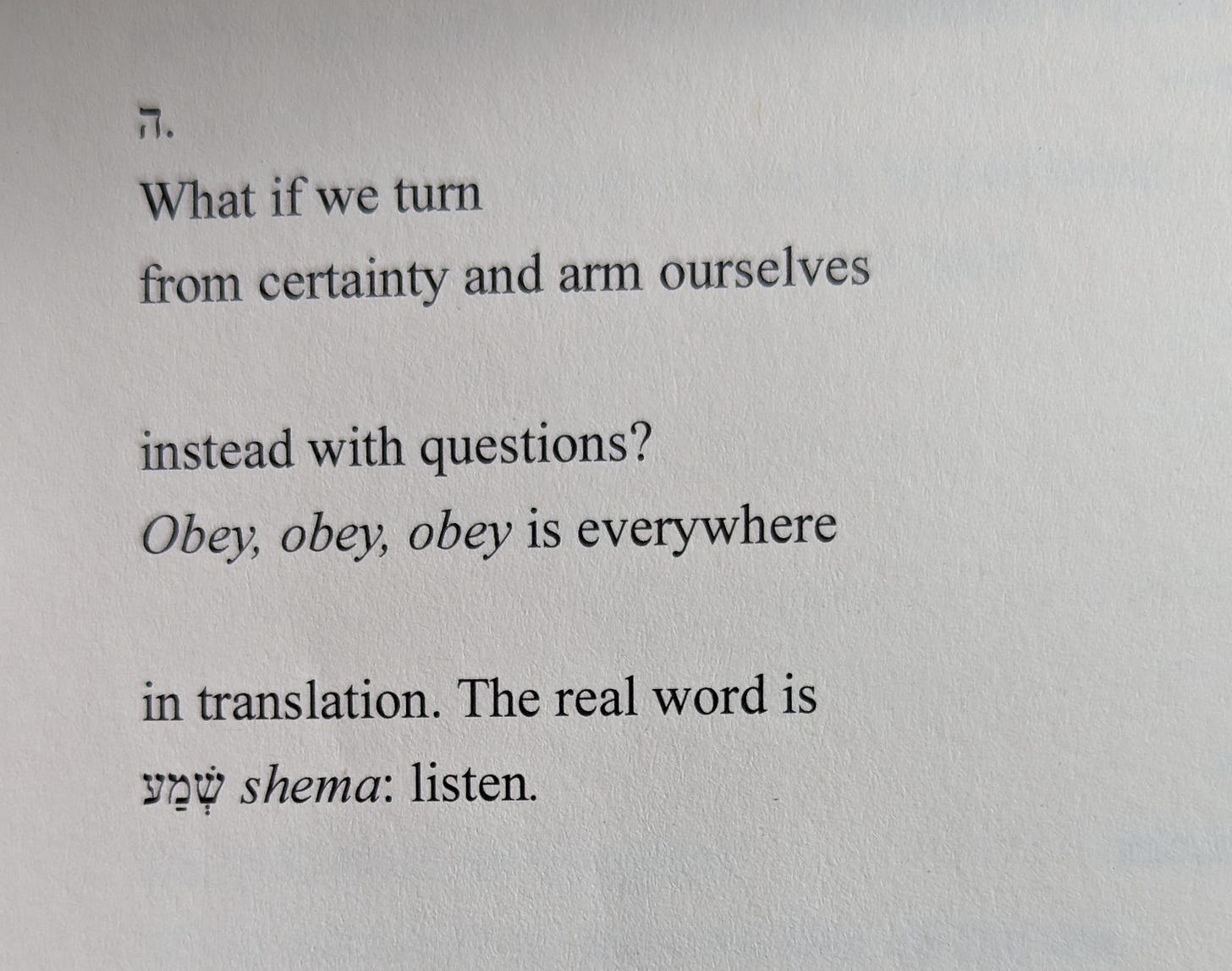
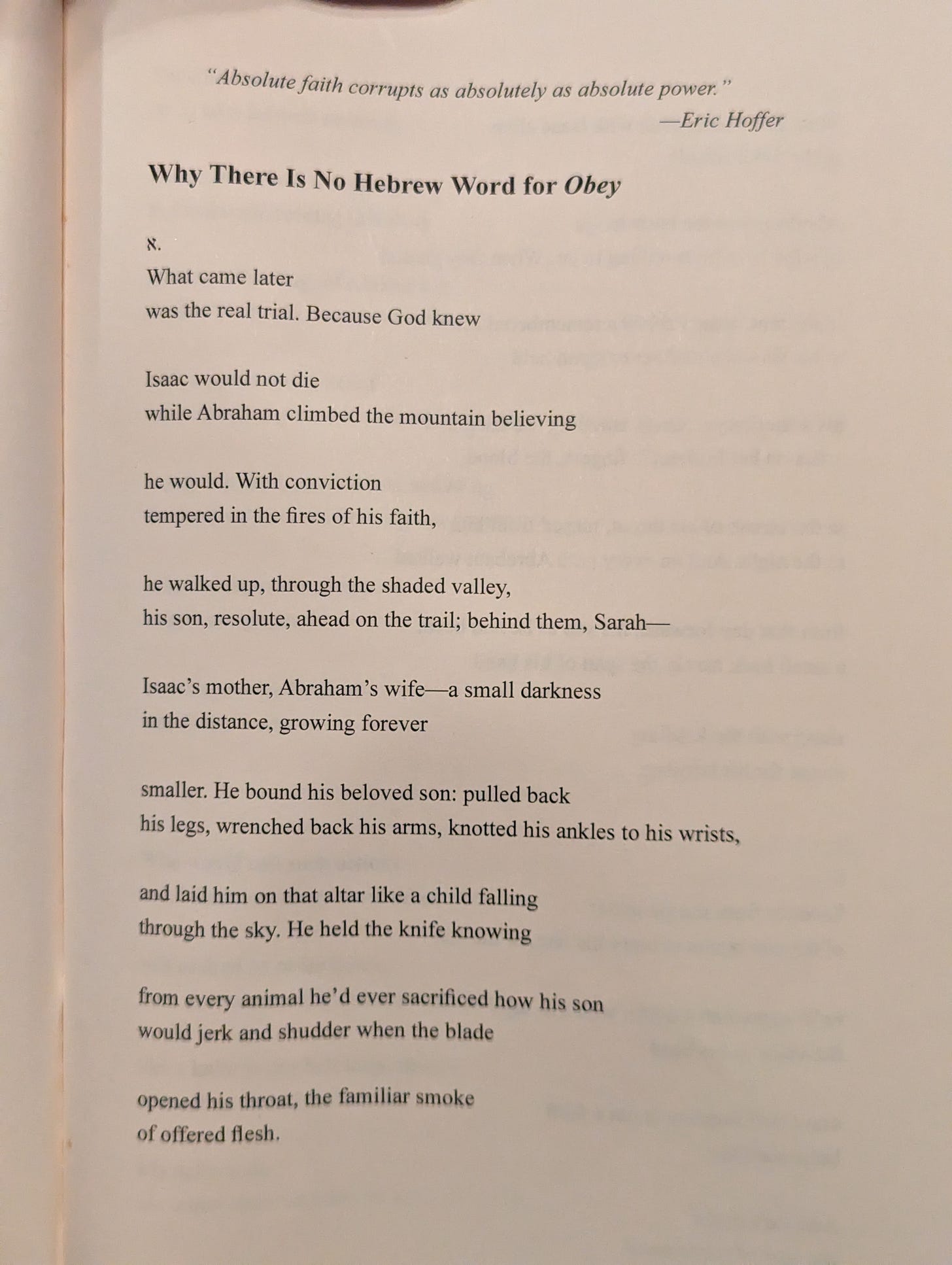

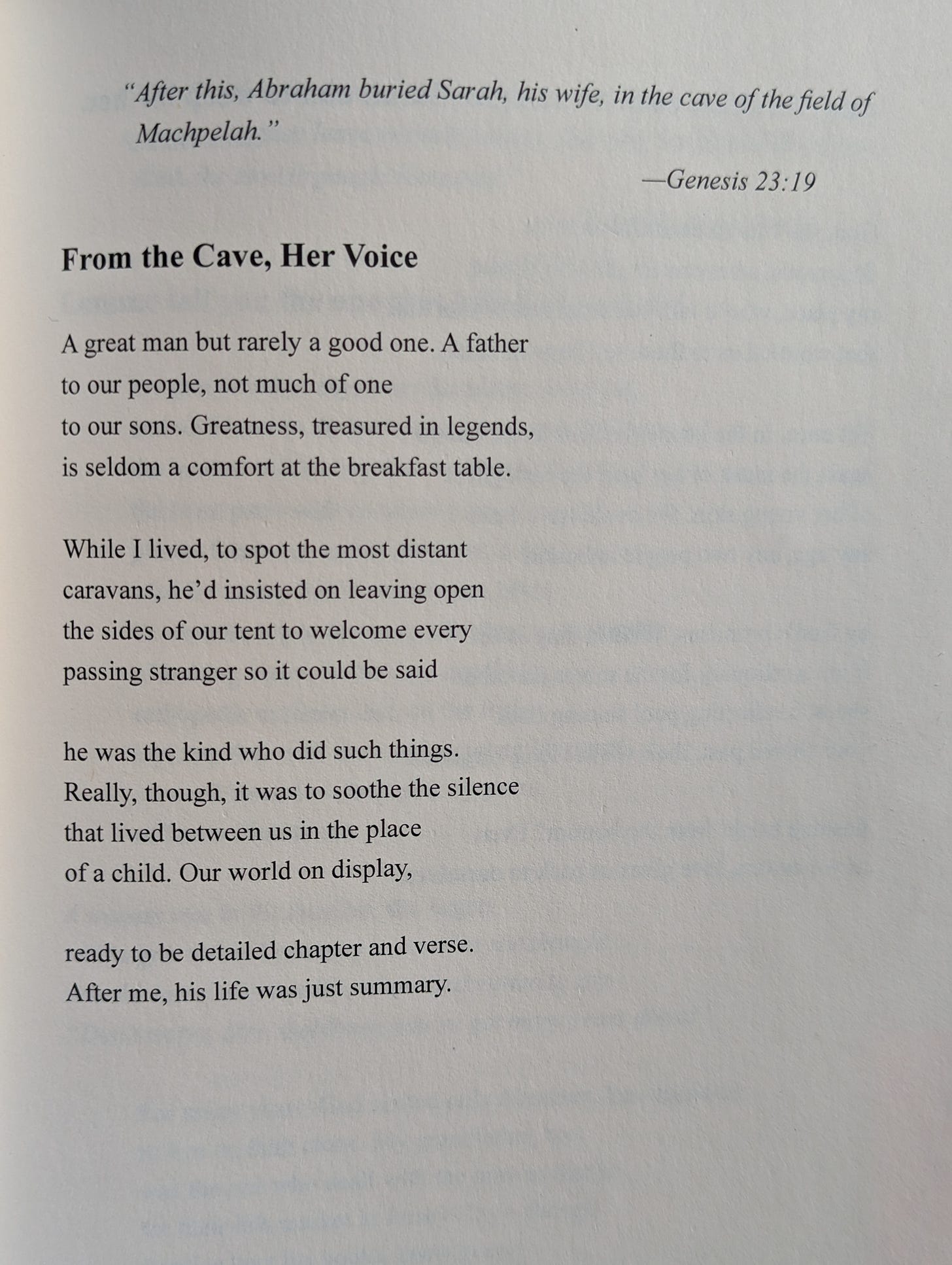
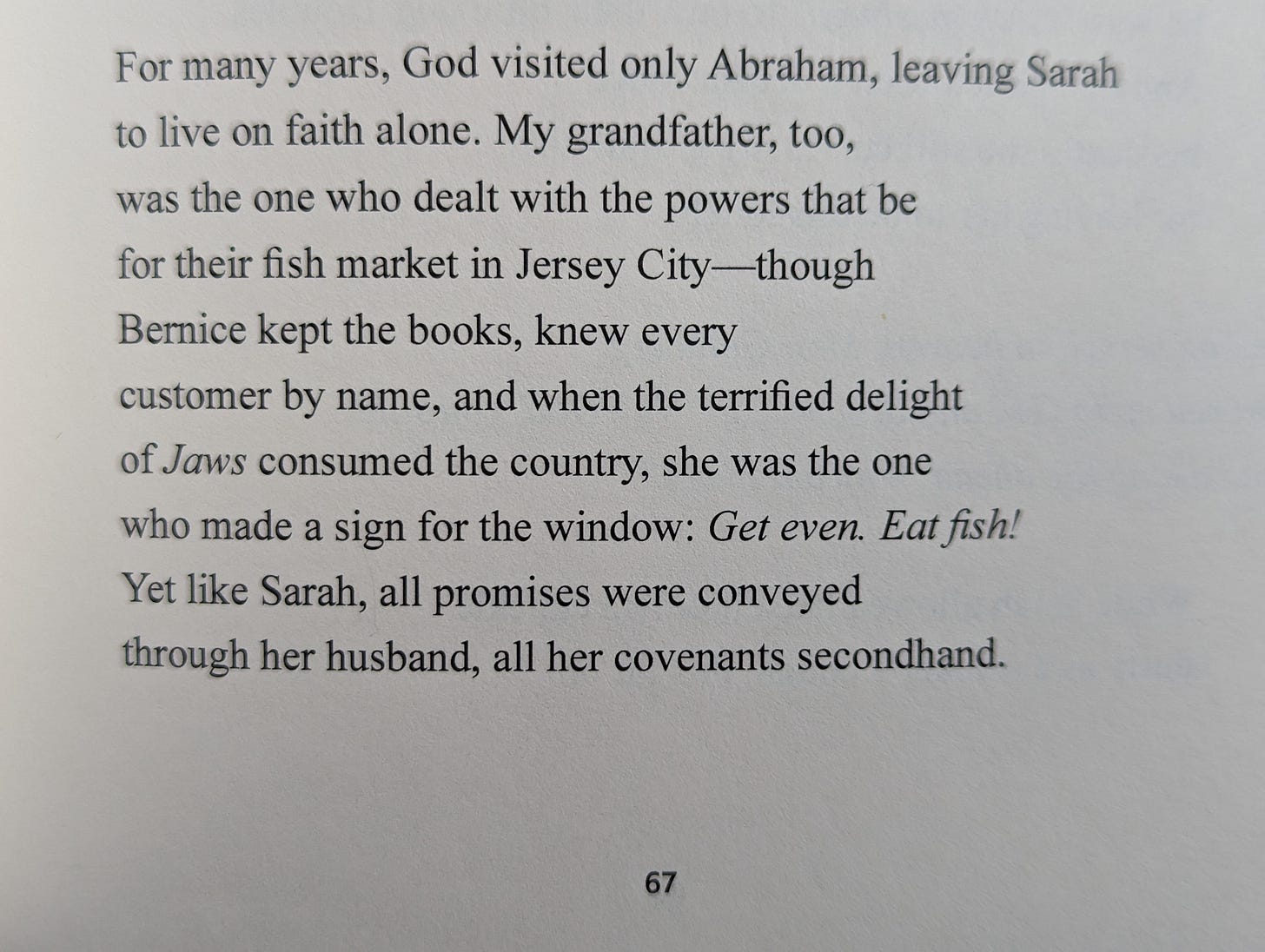
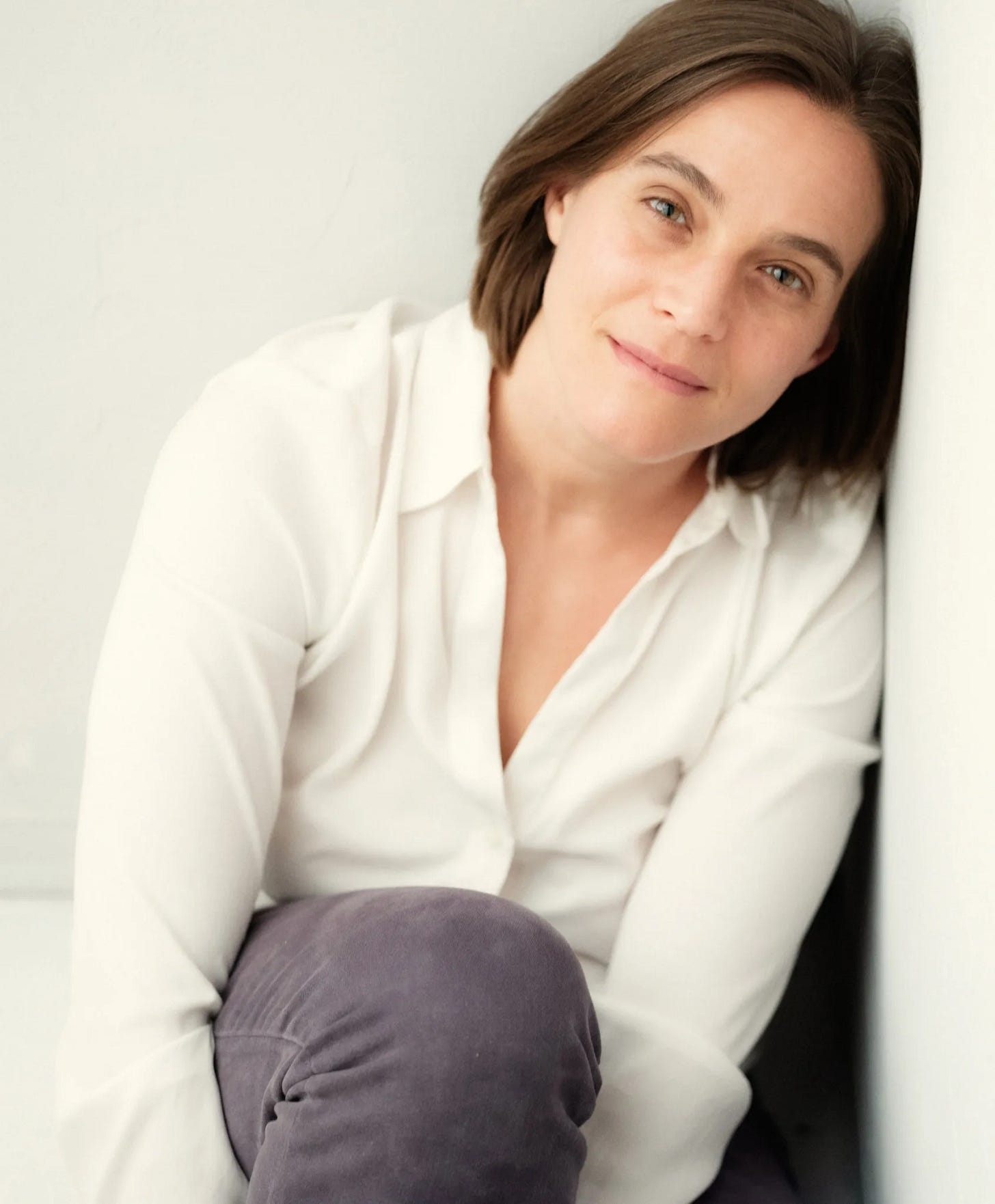
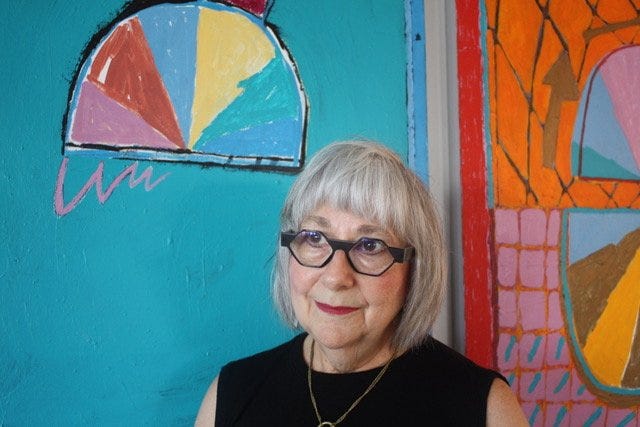

What a great piece, thoughtful and illuminating, with beautiful poem excerpts by Jessica Jacobs. Congratulations to you and to Jessica.